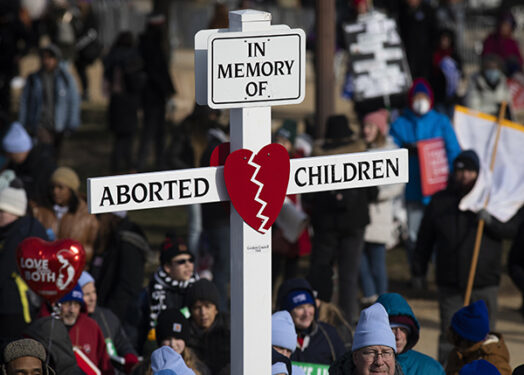
PROSPECT HEIGHTS — On Jan. 22, 2021, days after President Joe Biden took office, he issued a statement for the 48th anniversary of Roe v. Wade on the importance of pro-abortion policies, committing himself to enshrine the right to abortion in the Constitution and expand access to the procedure for women across the country.
More than two years later, that commitment hasn’t wavered through both actions and rhetoric.
“He has not been passive on abortion. He’s actively promoting and pushing abortions,” Archbishop Joseph Naumann of Kansas City in Kansas, former head of the U.S. Conference of Catholic Bishops’ Committee on Pro-Life Activities, told The Tablet. “He’s one of the main leaders in the culture of death in our country right now.”
Since the Supreme Court overturned Roe v. Wade last summer in the Dobbs v. Jackson Women’s Health Organization case, putting abortion law in the hands of the individual states, there is no action Biden can take to implement a nationwide right to an abortion absent congressional action.
So far, Biden has had little success passing abortion legislation through a divided Congress. His boldest attempt was his advocacy for the Women’s Health Protection Act, which, among other things, would have codified the right to abortion and forced religious practitioners to violate their religious beliefs and provide the procedure. He also tried, but failed, to do away with the longstanding Hyde amendment, which prevents the taxpayer funding of abortion.
However, through executive action, Biden has expanded abortion access on multiple occasions.
Last September, his administration for the first time made it so that the Department of Veterans Affairs would offer abortion in certain cases and provide abortion counseling to veterans. The rule was upheld by the Senate in April, at which time Archbishop Timothy Broglio of the Archdiocese of the Military Services, USA, called it “morally repugnant and incongruent with the Gospel.”
The Biden administration also expanded the availability of abortion pills via mail at the end of 2021. In the months after the Supreme Court overturned Roe, Biden signed two executive orders that included actions to protect a woman’s right to travel out of state for an abortion, expand accessibility of abortion medication at pharmacies, strengthen privacy laws, and further explore other pro-abortion actions the administration can take.
“He’s doing everything he can within the bounds of executive power to expand abortion,” said Richard Doerflinger, the former associate director of the U.S. bishops’ conference Secretariat for Pro-Life Activities. “It’s the most extreme position that we’ve ever seen.”
Beyond just policy decisions, Doerflinger and Archbishop Naumann also see harm in Biden’s rhetoric. The aforementioned statement he made on Jan. 22, 2021, the 48th anniversary of Roe, encapsulates the commitments he has made:
“In the past four years, reproductive health, including the right to choose, has been under relentless and extreme attack,” Biden said in the statement.
“We are deeply committed to making sure everyone has access to care — including reproductive health care — regardless of income, race, ZIP code, health insurance status, or immigration status,” he continued. “The Biden-Harris administration is committed to codifying Roe v. Wade and appointing judges that respect foundational precedents like Roe.”
Ahead of the 2022 midterm elections, he made similar comments on his commitment to codify abortion rights if Democrats take control of Congress. As he has signed executive actions throughout his term, he has often talked about the “extreme attack” abortion is under, and as Archbishop Naumann highlighted, has instilled fear.
“I think for the wider society, I think his statements have been irresponsible in trying to fearmonger people, and this is especially true after the Dobbs decision,” Archbishop Naumann said. “Also just his characterization of those that support the sanctity of the life of children, and posturing abortion as being health care, and this rhetoric that this is the most important right.
“I think that’s been very harmful. I think he has some of the responsibility for some of the violence that’s been done at pregnancy resource centers, because of some of the inflammatory language that the pro-abortion side uses and that he’s echoed,” he continued.
Doerflinger, who was with the USCCB for more than three decades before his 2016 retirement, also noted the contradiction that exists in Biden’s public support for abortion, and his outspokenness about his Catholic faith. It’s something U.S. bishops, too, have addressed.
“The fact that he keeps referring to his Catholic faith creates a very public contradiction,” Doerflinger said. “When a politician with that position continues to have seemingly friendly meetings with church leaders and to go to Mass publicly and receive Communion, it does create questions.”
Looking ahead, Biden is likely to continue campaigning on the issue of abortion, especially with the prominent Republican candidates being pro-life. Archbishop Naumann said it “saddens” him that the president is banking on “enough people in our country that think we need a right to kill our own children, which is essentially what he supports and stands for.
“Sadly, one of the things that we’ve seen post-Dobbs is with the extreme language that was used and fear that was created brought out a lot of first-time voters,” Archbishop Naumann said. “I don’t think he has a lot of other accomplishments to motivate people, so I think he’s banking on that.”
This is the fourth piece in a series about issues President Joe Biden stressed when he ran for office two years ago and where things stand today. The next story will look at unity. Previous stories have looked at immigration, gun violence, and the environment.
